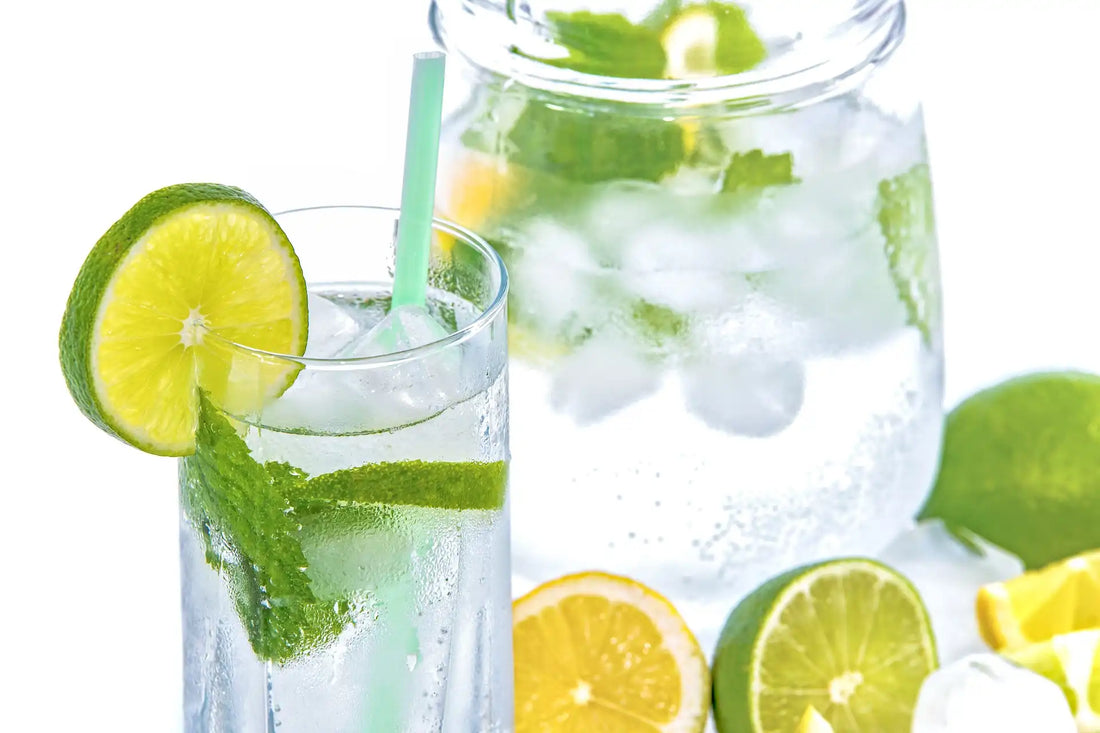
The Surprising Benefits of Hydration
Share
You might think of hydration as merely a cure for thirst, but what if we told you that the key to sharper memory, balanced moods, and even younger-looking skin lies in that humble glass of water on your desk?
Essential Takeaways:
- Hydration isn’t just about quenching your thirst. It impacts cognitive function, emotional balance, and overall health.
- Optimize your hydration with Hydration Drops. Adding a light squeeze to the drinks you already enjoy every day takes the guesswork out of maintaining your hydration levels.
Today, we’re going to explore the often-overlooked and surprising benefits of staying adequately hydrated. Prepare to see water in a whole new light.
- Introduction: Unveiling the Power of Proper Hydration
- Enhanced Cognitive Function
- Mood Regulation and Hydration
- Skin Health and Hydration
- Weight Management and Hydration
- Digestive Health and Hydration
- Physical Performance and Hydration
- Joint and Muscle Support Through Hydration
- Detoxification and Hydration
- Conclusion: Embrace the Power of Hydration
Introduction: Unveiling the Power of Proper Hydration
We've all heard the saying: "Drink more water!" But why? A shocking 75% of Americans are chronically dehydrated, falling short of the recommended eight 8-ounce glasses of water per day (1).
Beyond the obvious need to quench your thirst, staying hydrated offers numerous health benefits. In this blog, we’ll explore some of the lesser-known but incredibly important benefits of maintaining optimal hydration levels.
If you're interested in learning more about the issue of chronic dehydration and its symptoms, we encourage you to read our detailed blog post, Chronic Dehydration Symptoms Explained.
Enhanced Cognitive Function
Your brain's performance is intricately tied to your hydration levels. Various scientific studies, including research from the University of Connecticut, have demonstrated a direct relationship between hydration and cognitive functions like focus, memory, and mental clarity.
- Focus: Hydration plays a crucial role in maintaining focus. According to a study by the University of Connecticut, even mild dehydration can impact your attention span.
- Memory: Adequate water intake is essential for memory retention. Dehydration can impair your ability to absorb or recall information.
- Mental Clarity: Feeling foggy? A lack of adequate hydration can impede your decision-making and problem-solving abilities.
Even mild dehydration—just 1-2% loss of body water—can significantly impair your cognitive abilities (2). So the next time you're struggling to concentrate, it might not be a caffeine fix you need but a glass of water.
Mood Regulation and Hydration
Ever found yourself feeling uncharacteristically irritable or stressed, and couldn't put your finger on why? It might not just be a "bad day"—your hydration levels could be affecting your mood.
Scientific Evidence: Hydration as a Natural Mood Stabilizer
According to recent studies conducted at the University of Connecticut’s Human Performance Laboratory, even mild dehydration can substantially alter your mood (2).
Researchers discovered that dehydration can have adverse effects on mood and cognitive functions, regardless of whether one is resting or performing physical activities. This mild dehydration is defined as an approximately 1.5% loss in normal body water volume (2).
In tests involving both men and women, mild dehydration led to headaches, difficulty in concentrating, and increased perception of task difficulty. The studies suggest that women are more susceptible to adverse mood changes due to dehydration compared to men (2).
Cortisol Levels and Hydration
Moreover, adequate hydration is associated with lower cortisol levels—the hormone linked with stress. A balanced cortisol level can help to stabilize mood, reduce stress, and improve emotional well-being (2).
So, keeping yourself well-hydrated isn't just about physical wellness; it's a holistic approach to managing your emotional health, too.
Skin Health and Hydration
While beauty gurus tout the benefits of various elixirs for radiant skin, the truth is that water remains the ultimate skin tonic. Hydration plays a fundamental role in maintaining the elasticity of your skin, giving it that youthful, supple look.
Dehydration and Skin Problems: What’s the Connection?
Skimping on water intake does more than just make you thirsty, it can also adversely affect your skin. Consistent lack of hydration can lead to a wide range of skin issues, such as:
- Premature Wrinkling: Lack of moisture can accelerate the appearance of fine lines and wrinkles.
- Enlarged Pores: Dehydrated skin may make your pores more visible.
- Acne: Dehydration can result in an imbalance in oil production, contributing to acne.
- Flakiness or Peeling: A lack of hydration can make the skin dry and flaky, causing it to peel.
- Redness and Irritation: Dehydrated skin can become more sensitive, leading to redness and irritation.
- Dullness: When the skin lacks water, it can lose its natural luster and look dull.
- Increased Oil Production: Paradoxically, dehydrated skin may produce more oil to compensate, resulting in an oily complexion (3).
Your skin is a mirror of your internal health, and maintaining proper hydration can keep it looking young, vibrant, and radiant.
Weight Management and Hydration
Are you looking to shed some pounds? Proper hydration can be your secret weapon. While diet and exercise are often the focal points of weight management, staying hydrated can also offer distinct advantages in your journey toward a healthier weight.
The Science of Satiation: Water and Fullness
Drinking water before meals, known as "preloading," has been studied for its ability to increase feelings of fullness. By doing this, you're less likely to overeat, thereby reducing your calorie intake. Research shows that people who drink water before meals consume an average of 75 fewer calories at each meal (4).
Boosting Metabolism: How Hydration Helps
Staying adequately hydrated has been shown to increase your metabolic rate. According to research, drinking 17 ounces of water can increase your metabolism by 30% for up to 40 minutes. This means you'll be burning calories more efficiently, which is a plus when you're trying to manage your weight (4).
Digestive Health and Hydration
A well-hydrated system is fundamental to healthy digestion. While most people associate hydration with better skin or physical performance, its role in digestive health is just as critical. Water is indispensable in breaking down food, absorbing nutrients, and eliminating waste (1).
The Role of Hydration in Nutrient Absorption
Water is essential for breaking down food in the digestive tract and facilitating the absorption of nutrients. Without adequate hydration, nutrient absorption can be compromised, affecting your overall health (1).
Water and Waste Elimination
Proper hydration is also vital for waste elimination. Water helps to soften stool and promote regular bowel movements, reducing the likelihood of constipation (1).
Preventing Digestive Issues Through Hydration
A lack of hydration can contribute to a variety of digestive issues, from acid reflux to urinary tract infections. Staying hydrated not only supports digestion but also acts as a preventative measure against these common issues (1).
Physical Performance and Hydration
For athletes and fitness enthusiasts, hydration is a performance enhancer. Research indicates that even a slight decrease in body water can have a significant impact on physical performance (5).
Dehydration can lead to a reduced VO2 max, which is the maximum amount of oxygen your body can utilize during intense exercise. This means a drop in endurance and a less effective workout (5).
Reducing Perceived Effort Through Hydration
Researchers have also found that adequate hydration can reduce the perception of effort, making your workout feel less taxing and increasing your likelihood to push harder and go longer (5).
Beyond Aerobics: Hydration and Strength Training
Additionally, it's not just aerobic performance that benefits from proper hydration. Strength and power athletes will find that proper water intake can improve muscle recovery times and potentially increase muscle protein synthesis, offering a comprehensive advantage for physical performance (5).
This underscores the critical importance of hydration for anyone looking to achieve their best in physical activities.
Joint and Muscle Support Through Hydration
When it comes to joint and muscle health, hydration serves as a natural lubricant and shock absorber. Think of it this way: just as oil keeps a machine running smoothly, fluids keep our joints supple and muscles responsive.
Hydration and Arthritis: A Link to Consider
This is crucial not only for athletes but also for those experiencing age-related joint problems or conditions like arthritis. Scientific studies have indicated that hydration levels can influence the viscosity of the synovial fluid, which is the fluid that cushions joints (1).
Quick Recovery and Muscle Performance
Lower viscosity due to dehydration can exacerbate the wear and tear on joints, which can contribute to conditions like osteoarthritis. Moreover, proper hydration can assist in quicker muscle recovery after workouts or strenuous activities, minimizing the chances of cramps and muscle fatigue (5).
Detoxification and Hydration
While "detox" diets and cleanses often make headlines, it's essential to recognize the body's natural detoxification mechanisms, with hydration playing a key role.
The Role of Kidneys and Liver in Detox
Water is involved in nearly every bodily function, including the vital process of detoxification. Our liver and kidneys work tirelessly to filter out toxins, and they require an adequate amount of water to function optimally (1,6).
The Risks of Inadequate Hydration on Detox
Studies have shown that inadequate hydration can result in less efficient kidney function, leading to the accumulation of toxins in the body. This can lead to urinary tract infections, kidney stones, and even impaired immune function (6).
The Pathways of Elimination: Beyond Just Urine
When you're well-hydrated, your body is better equipped to flush out toxins through urine, sweat, and even respiration. The clearer these pathways, the more efficiently your body can eliminate waste, supporting not only detoxification but overall well-being (1).
Conclusion: Embrace the Power of Hydration
The wide array of benefits derived from proper hydration is astonishing. From sharper mental faculties to healthier skin and from weight management to effective detoxification—hydration is not something to be overlooked. It's a foundational element in your journey to better health and well-being.
If you find it challenging to keep up with your hydration needs, consider Buoy as your go-to solution. With Buoy's variety of hydration drops—like Buoy Hydration Drops, Buoy Energy Drops, and Buoy Immunity Drops—you can easily optimize your water intake to reap the often-surprising advantages that proper hydration offers.
For those interested in learning how to hydrate more effectively, don't miss our comprehensive guide on How to Hydrate Quickly and Effectively.
Check out the Buoy Daily Wellness Bundle to effortlessly incorporate hydration into your daily routine. So go ahead and embrace the power of hydration—your body and mind will thank you.
References:
- Popkin, B. M., D'Anci, K. E., & Rosenberg, I. H. (2010). Water, Hydration, and Health. Nutrition Reviews, 68(8), 439–458. Retrieved from https://www.ncbi.nlm.nih.gov/pmc/articles/PMC2908954/
- UConn Today. (2012). Even Mild Dehydration Can Alter Mood. Retrieved from https://today.uconn.edu/2012/02/even-mild-dehydration-can-alter-mood/
- Palma, L., Marques, L. T., Bujan, J., & Rodrigues, L. M. (2015). Dietary Water Affects Human Sskin Hydration and Biomechanics. Clinical, Cosmetic and Investigational Dermatology, 8, 413–421. Retrieved from https://doi.org/10.2147/CCID.S86822
- Thornton S. N. (2016). Increased Hydration Can Be Associated with Weight Loss. Frontiers in Nutrition, 3, 18. Retrieved from https://doi.org/10.3389/fnut.2016.00018
- Shirreffs, S.M., et al. (2004). Fluid and Electrolyte Needs for Preparation and Recovery from Training and Competition. Journal of Sports Sciences, 22(1), pp. 57–63. Retrieved from https://www.tandfonline.com/doi/abs/10.1080/0264041031000140572
- Blaine, J., Chonchol, M., & Levi, M. (2015). Renal Control of Calcium, Phosphate, and Magnesium Homeostasis. Clinical Journal of the American Society of Nephrology, 10(7), 1257-1272. Retrieved from https://pubmed.ncbi.nlm.nih.gov/25287933/








